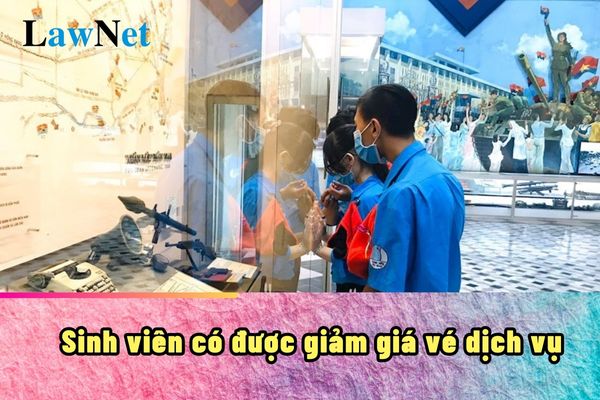Are Students in Vietnam Eligible for Discounts on Tickets for Historical Museum Visits?
Are Students in Vietnam Eligible for Discounts on Tickets for Historical Museum Visits?
Pursuant to the provisions of Clause 2, Article 10 of Decree 84/2020/ND-CP regarding the exemption and reduction of public service fees for students:
- For public transport services:
+ Pupils and students are entitled to reduced train and bus fares;
+ Public transport entities issue discounted tickets to students upon presentation of a student card.
- For public services related to entertainment, museum visits, historical sites, and cultural works:
+ Pupils and students are eligible for discounted service fees when directly using services including museums, historical sites, libraries, and exhibitions;
+ Cultural and entertainment facilities issue discounted tickets to students upon presentation of a student card.
- Based on specific conditions, the Chairman of the Provincial People's Committee decides the level of exemption and reduction of public service fees for students under their management.
- Pupils and students with disabilities are granted exemptions and reductions in public service fees for transportation, entertainment, museum visits, historical sites, and cultural works as stipulated in Decree 28/2012/ND-CP.
Pupils and students who are social policy beneficiaries are eligible for reduced train fares as stipulated in Decree 65/2018/ND-CP.
According to the above provisions, students will be granted discounts on public service fees related to entertainment, museum visits, historical sites, and cultural works. Specifically, students are eligible for discounts on service fees when directly using services including museums, historical sites, libraries, and exhibitions.
Thus, students will receive discounted service fees for visits to historical museums.

Are Students in Vietnam Eligible for Discounts on Tickets for Historical Museum Visits? (Image from the Internet)
What is the ticket price for visiting the National Museum of History of Vietnam?
Pursuant to the provisions of Article 4 of Circular 163/2016/TT-BTC regarding fee rates:
Fee RatesThe fee rates are prescribed as follows:
1. For adults: VND 40,000/person/visit.
2. For students and pupils (learners) in universities, colleges, intermediate, and vocational schools: VND 20,000/person/visit.
Students and pupils (learners) are those with student cards issued by educational institutions within the national education system in Vietnam.
3. For children and pupils in primary and secondary educational institutions: VND 10,000/person/visit.
a) Children mentioned in Clause 3 of this Article are individuals aged from 6 to under 16. In case of difficulty in determining whether an individual is under 16, a birth certificate, passport, identity card, or any other document proving the age must be presented.
b) Pupils are those with pupil cards issued by educational institutions within the national education system in Vietnam.
Thus, the admission fee for students visiting the National Museum of History is as follows:
- For students and pupils (learners) in universities, colleges, intermediate, and vocational schools: VND 20,000/person/visit.
Students and pupils (learners) are those with student cards issued by educational institutions within the national education system in Vietnam.
*Note: In cases where it is difficult to determine whether an individual is under 16, a birth certificate, passport, identity card, or any other document proving the age must be presented.
What percentage of the total fee collected, including the fee from students on field trips, is retained by the National Museum of History of Vietnam?
Pursuant to Article 7 of Circular 163/2016/TT-BTC:
Management and Use of Fees
The fee-collecting organization is permitted to retain 90% of the total fee revenue collected to cover expenses in accordance with Clause 2, Article 5 of Decree No. 120/2016/ND-CP dated August 23, 2016, of the Government of Vietnam, detailing and guiding the implementation of several articles of the Law on Fees and Charges; 10% of the fee revenue collected shall be remitted to the state budget according to the corresponding chapter, item, and sub-item of the State Budget Index.
Concurrently, pursuant to Article 3 of Circular 163/2016/TT-BTC regulating fee-collecting organizations:
Fee-Collecting Organization
The National Museum of History (under the Ministry of Culture, Sports, and Tourism) is the organization responsible for collecting fees.
Thus, the National Museum of History is allowed to retain 90% of the total fee revenue collected (including fees from ticket sales to students and other visitors) to cover expenses and must remit 10% of the fee revenue collected to the state budget according to the corresponding chapter, item, and sub-item of the State Budget Index.

